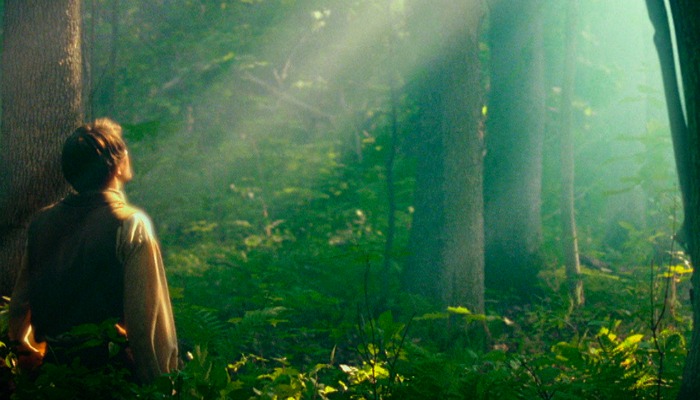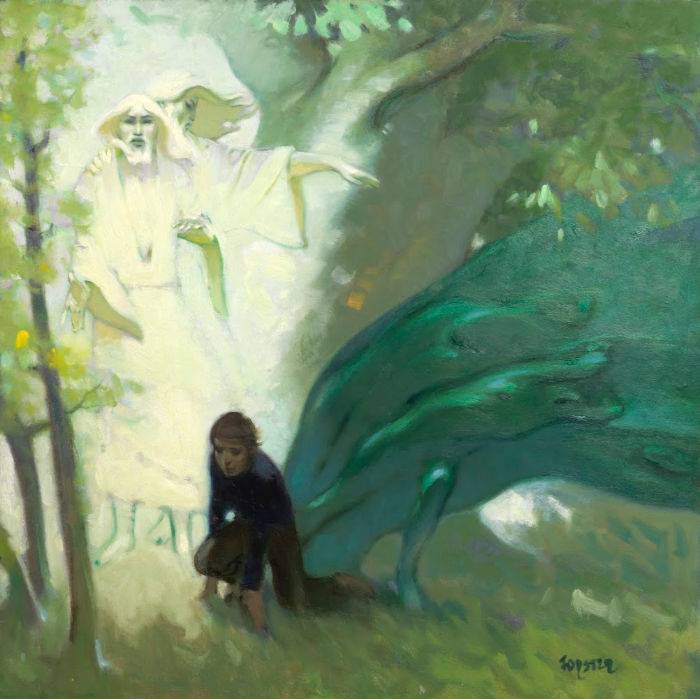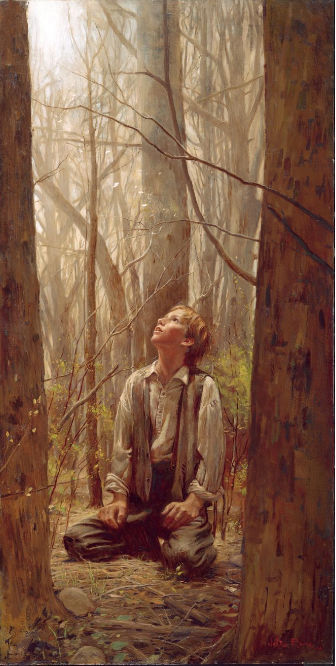
I had doubted, shortly after being excommunicated, that I would seek to be readmitted to the Church through baptism.
In all honesty, I knew I could go to Church, sit with my family, and be a part of the Church community without having to enter into that covenant. I had felt the forgiveness from the Lord, I had begun to repair things with my family as we sought healing together, and the Lord helped me escape behavior that I didn’t think was possible to abandon. So why would I need to rejoin the Church? Maybe it would be easier to remain in the world, loosely connected to the Church.
I put the question to my stake president who reminded me that “the first fruits of repentance is baptism…” and that it wouldn’t be long before I would have the strongest desire to be baptized and receive the constant companionship of the Holy Ghost.
I was reminded of a lesson I learned years ago but had forgotten over time. In reading Joseph Smith History, the canonized version of Joseph Smith’s first visitation, I discovered that there were some parallels between the historical Restoration of the Church through the young prophet, and the restoration of the soul, through the application of those restored principles and ordinances.
Beginning during my time as a missionary, and slowly expanding over time, I had begun to despise the prophet, Joseph Smith.
I had my questions and concerns about his divine calling, which were mostly rooted in how Church members’ adoration of him seemed to cross the line over to worship. I let that disdain grow, which lead to the cultivation of other concerns I had with the Restored Church. Rarely did I ever vocalize these concerns, as seems to be the trend among many today.
The Parallel Dilemma

I then hit a low point in my life and was reading Joseph Smith history and began to empathize with the prophet. Much like his time, we are experiencing an unusual excitement on the subject of religion, but where theirs was of religious revival, while we are experiencing a demise. Both “…created no small stir and division amongst the people,” with the various worldly groups contending for our attention, many voices of the world “crying, ‘Lo, here!’ and others, ‘Lo, there!’
Joseph’s description of “the great love, zeal, and extraordinary scene of religious feeling” matches the strategies of today’s cries to join the secular scene where the “seemingly good feelings of [all parties] are more pretended than real.”
These voices extend into the often unvetted virtual world of social media, causing us a complex “scene of great confusion and bad feelings”….friends contending against friends and strangers contending against strangers… “so that all their good feelings one for another, if they ever had any, were entirely lost in a strife of words and a contest about opinions.”
This is the world I know, a world that calls good evil and evil good. It is a world that I found myself becoming more and more acquainted with. I had my good moments with my faith and some weak moments with my heart and “mind [being] called up to serious reflection and great uneasiness;….still keeping myself aloof from these parties, though I often” found myself visiting their ideas too often.
I felt the same youthful inadequacy Joseph expressed when he felt like it was all impossible, being “so unacquainted with men and things, to come to any certain conclusion as to who was right and who was wrong.” I was just a young college kid who grew up in rural Wyoming and Utah. I wouldn’t say that I was sheltered, but I also had little experience in the world.
But it is quite obvious that, like the religions in Joseph’s day, the various religions, philosophies, and organizations in our day create the same “great and incessant cry and tumult” that leave many confused and troubled.
Like him, I wondered what was to be done. Should I stay in the Church, though these other things made sense? What if I go there and I am wrong? What if I do and it’s right? “How shall I know it?”
The Primary Answers
I find it slightly grating that in Sunday School when we ask a question about how to improve our lives or have divine guidance, it seems like someone always bashfully answers, “well these are the Primary answers, so read your scriptures, say your prayers and go to church.” First of all, these are definitely the primary answers, as in main, principle, or foundational answers. These are the simple basic answers in the gospel. And knowing that we teach these things to our children speaks volumes, especially when the Lord tells us that “unless we become converted, and become like little children, ye shall not enter into the kingdom of heaven.” This example is shown to us through a 14-year-old boy seeking for the Lord to answer his questions.
Scripture Study
Like Joseph, “laboring under the extreme difficulties caused by the contests of these parties and religionists,” I took to the scriptures. I wasn’t seeking to know which Church was true but seeking if I could be truly converted to the Lord and live faithfully in this Church. The pull of the world was and still remains strong. Joseph then encountered a scripture in James 1:5 which teaches that those who lack wisdom will receive an answer if they ask God.
And like Joseph “if any person needed wisdom from God, I did; for how to act I did not know, and unless I could get more wisdom than I then had, I would never know.” I had grown up confused about life, and the many different opinions of the world did not help. I immersed myself in the scriptures, trying to find answers that I longed for. I came to the same conclusion as Joseph that “I must either remain in darkness and confusion, or I must ask of God.”
Prayer
Now I had never retired to the woods to pray, but I often “found myself alone,” which was much more the problem in my life. I could be in a room full of people and feel like I never belonged, though it never showed. Looking back now, every time “I kneeled down to offer up the desires of my heart to God,” it was rarely done in faith. Mostly it was me trying to counsel the Lord. My desires were often such that prayed “Why can’t this be okay? Why are your laws so stringent? Why can’t I be me?”
My prayers were out of desperation because I often found myself “seized upon by some power which entirely overcame me,” often in the form of depression, pride, or overwhelming temptation. When I gave in, those powers had “such an astonishing influence over me as to bind my tongue so that I could not speak.” The adversary will do anything and everything in his power to keep our mouths shut. To keep us from repenting, to keep us from leaning on others. He uses shame, embarrassment, and fear. Sometimes that power is so strong that, like Joseph experienced, “thick darkness gathers” and “sudden destruction seems” imminent.
There is a reason that prayer is the one thing that is recommended to overcome that adversary. To ask for divine help from God in the moment of crisis. To ask Him to be our ally when the adversary attacks, gives us advantage over Satan and his hosts, that in the “very moment” when we are ready to give up and “sink into despair,” abandoning ourselves to our own destructive behaviors and, the actual power of the enemy of Christ, the act of prayer can help deliver us.
Testimony

I found myself in the same situation that I did years ago when I first discovered that the initial visitation and the Restoration of Christ’s Church was actually a principle for our lives. I know that I am not the only one that has a parallel experience with the prophet, but like his, our prayers can be answered and our testimonies can grow.
When Joseph found himself “delivered from the enemy which held him bound,” it was when he saw a brilliant “pillar of light” over his head. It “descended gradually,” until it fell upon [him].” It is important to emphasize the word gradually. For Joseph, it was likely a manner of minutes before he saw God the Father and His Son, but for us, “gradually” might mean a longer time frame, but no less powerful. Once you have a divine witness of God and His Son, once you obtain divine truth for yourself through the light of Christ and the manifestation of the Spirit, you have more power than the adversary and your questions can be answered.
For Joseph, and for myself, the answer is that all the creeds of the world are an abomination in his sight,” that there are corruptions and false doctrines. That “they draw near to me with their lips, but their hearts are far from me, they teach for doctrines the commandments of men, having a form of godliness, but they deny” any real godly power. They speak in terms of love and acceptance, but they deny the doctrine of Christ and other principles of the gospel, intended for our repose and salvation. I didn’t want to belong to the world like I thought I wanted to. I wanted to belong to Christ, and I wanted to belong to Christ’s Church.
The Restorative Gift of Baptism
To circle back to my original question of why should I get baptized? Simply put, I wasn’t only seeking forgiveness, I was seeking restoration, remission of sins, and sanctification which come through living the laws and ordinances of the gospel and application of the doctrine of Christ. Christ sets the conditions, and I now have an opportunity to choose those conditions, receive a remission of my sins, be sanctified and guided by the Holy Ghost, and continue on the path.
I was baptized a year after my excommunication because it didn’t take long for me to want to make those covenants with the Lord. I didn’t want to only go to Church, I wanted to be counted among these wonderfully flawed people. We aren’t perfect. We don’t have all the answers, but we, like Joseph Smith, found through the primary answers, those daily habits of faith, the answers that sustain our testimony in Christ, our Savior and Redeemer.





